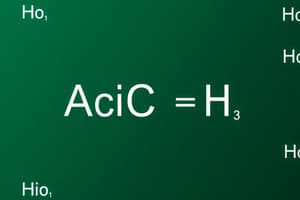Podcast
Questions and Answers
What is the correct name for an acid that does not contain oxygen in its molecule?
What is the correct name for an acid that does not contain oxygen in its molecule?
- Nitric acid
- Hydracid (correct)
- Oxyacid
- Sulfate
What is the name of the acid residue derived from hydrochloric acid (HCl)?
What is the name of the acid residue derived from hydrochloric acid (HCl)?
- Bromide
- Sulfite
- Sulfide
- Chloride (correct)
Which of the following is the correct name for H2SO3?
Which of the following is the correct name for H2SO3?
- Sulfuric acid
- Hydrosulfuric acid
- Sulfate
- Sulfurous acid (correct)
If a nonmetal forms only one oxyacid, how is its name typically derived?
If a nonmetal forms only one oxyacid, how is its name typically derived?
What is the correct name for the acid residue of HNO3?
What is the correct name for the acid residue of HNO3?
What is the correct formula for Ferrous sulfate with reference to its valence?
What is the correct formula for Ferrous sulfate with reference to its valence?
Which of the following correctly identifies a salt derived from an oxyacid?
Which of the following correctly identifies a salt derived from an oxyacid?
What name is given to the acid residue from H₂CO₃?
What name is given to the acid residue from H₂CO₃?
What is the correct naming for the salt with the formula MgCl₂?
What is the correct naming for the salt with the formula MgCl₂?
Which statement correctly describes the naming convention for acids that contain oxygen?
Which statement correctly describes the naming convention for acids that contain oxygen?
What is the molecular formula for Potassium nitrate?
What is the molecular formula for Potassium nitrate?
Which of the following salts would be named using the suffix for the higher valence state?
Which of the following salts would be named using the suffix for the higher valence state?
Which formula corresponds to barium sulfate?
Which formula corresponds to barium sulfate?
Flashcards
Oxyacids
Oxyacids
Acids that contain oxygen in their molecule.
Hydracides
Hydracides
Acids that do not contain oxygen in their molecule.
Acid residue
Acid residue
The negatively charged part of an acid that remains after a hydrogen ion (H+) is removed.
Salt
Salt
Signup and view all the flashcards
Salt molecule structure
Salt molecule structure
Signup and view all the flashcards
'-ous' suffix
'-ous' suffix
Signup and view all the flashcards
'-ic' suffix
'-ic' suffix
Signup and view all the flashcards
Stock System
Stock System
Signup and view all the flashcards
Naming Hydracids
Naming Hydracids
Signup and view all the flashcards
Naming Oxyacids (Single Form)
Naming Oxyacids (Single Form)
Signup and view all the flashcards
Salt Naming
Salt Naming
Signup and view all the flashcards
Study Notes
Naming Acids and Salts
- Acids without oxygen are called hydracids
- Acids with oxygen are called oxyacids
- Salts are made of a metal and an acid residue
- Acid residue names are based on the acid
- Different valences of the metal require different suffixes or roman numerals
- The valence of the metal is used to distinguish different salts of the same metal and acid residue.
Studying That Suits You
Use AI to generate personalized quizzes and flashcards to suit your learning preferences.




